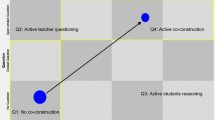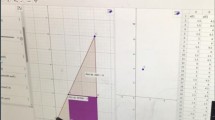Abstract
Dynamic representations (e.g., dynamic geometry software GeoGebra for mathematics learning and PhET simulations for science learning) offer excellent opportunities for students to conduct investigations and to formulate explanations for the visualized phenomena. In order for this to be effective, students need guidance, for example, for planning their investigations and reflecting on their actions. One way to support students is by prompting them by using questions that are adapted to the students’ current situation. This chapter focuses on how pre-service teachers provide guidance for students through questioning and by both structuring and problematizing student learning. Data comes from science lessons taught by pre-service primary school teachers and mathematics lessons taught by pre-service subject teachers. The analysis focused on the different question types the pre-service teachers used as well as how their questioning was adapted to students’ situation. The results show how the pre-service teachers used questions both to structure student thinking and to problematize their answers and reasoning. Questioning was not always adapted to the students’ needs. We propose that adapting teacher questioning to student thinking requires balancing between structuring and problematizing and high level of interpretation from the teacher. Teachers’ skills for interpretation are still beyond the skills of software. Implications for teaching with dynamic representations are discussed.
Access this chapter
Tax calculation will be finalised at checkout
Purchases are for personal use only
Similar content being viewed by others
References
Ainsworth, S., van Labeke, N.: Multiple forms of dynamic representation. Learn. Instr. 14(3), 241–255 (2004)
Cai Y., van Joolingen W., Walker Z. (eds.). VR, Simulations and Serious Games for Education. Gaming Media and Social Effects. Springer. (2019)
Chin, C.: Teacher questioning in science classrooms: approaches that stimulate productive thinking. J. Res. Sci. Teach. 44(6), 815–843 (2007)
de Jong, T.: Technological advances in inquiry learning. Science 312(5773), 532–533 (2006)
de Jong, T., van Joolingen, W.R.: Scientific discovery learning with computer simulations of conceptual domains. Rev. Educ. Res. 68(2), 179–201 (1998)
de Jong, T., Lazonder, A.W.: The guided discovery learning principle in multimedia learning. In: The Cambridge Handbook of Multimedia Learning, pp. 371–390 (2014)
Hähkiöniemi, M., Leppäaho, H., Francisco, J.: Teacher-assisted open problem-solving. Nordic Stud. Math. Educ. 18(2), 47–69 (2013)
Hähkiöniemi, M.: Using questioning diagrams to study teacher-student interaction. In: Silfverberg, H., Kärki, T., Hannula, M.S. (eds.) Nordic Research iIn Mathematics Education: Proceedings of NORMA14, Turku, June 3–6, 2014 pp. 91–100. Finnish Research Association for Subject Didactics, Turku, Finland (2015)
Hähkiöniemi, M.: Student teachers’ types of probing questions in inquiry-based mathematics teaching with and without GeoGebra. Int. J. Math. Educ. Sci. Technol. 48(7), 973–987 (2017)
Jordan, B., Henderson, A.: Interaction analysis: foundations and practice. J. Learn. Sci. 4(1), 39–103 (1995)
Kirschner, P.A., Sweller, J., Clark, R.E.: Why minimal guidance during instruction does not work: an analysis of the failure of constructivist, discovery, problem-based, experiential, and inquiry-based teaching. Educ. Psychol. 41(2), 75–86 (2006)
Krajcik, J., Blumenfeld, P.C., Marx, R.W., Bass, K.M., Fredricks, J., Soloway, E.: Inquiry in project-based science classrooms: initial attempts by middle school students. J. Learn. Sci 7(3–4), 313–350 (1998)
Lazonder, A.W., Harmsen, R.: Meta-analysis of inquiry-based learning: effects of guidance. Rev. Educ. Res. 86(3), 681–718 (2016)
Lehtinen, A., Hähkiöniemi, M.: Complementing the guidance provided by a simulation through teacher questioning. In: Proceedings of the Annual Symposium of the Finnish Mathematics and Science Education Research Association 2015, ISBN 978–952–93–8233–0. Matematiikan ja luonnontieteiden opetuksen tutkimusseura ry (2016)
Lehtinen, A., Viiri, J.: Guidance provided by teacher and simulation for inquiry-based learning: a case study. J. Sci. Educ. Technol. 26(2), 193–206 (2017)
Nieminen, P., Hähkiöniemi, M., Viiri, J.: Forms and functions of on-the-fly formative assessment conversations in physics inquiry lessons. Int. J. Sci Educ, 1–23 (2020)
Reiser, B.J.: Scaffolding complex learning: the mechanisms of structuring and problematizing student work. J. Learn. Sci. 13(3), 273–304 (2004)
Ruiz-Primo, M.A.: Informal formative assessment: the role of instructional dialogues in assessing students’ learning. Stud. Educ. Eval. 37(1), 15–24 (2011)
Sahin, A., Kulm, G.: Sixth grade mathematics teachers’ intentions and use of probing, guiding, and factual questions. J. Math. Teacher Educ. 11(3), 221–241 (2008)
Sherin, M., Jacobs, V., Philipp, R. (eds.): Mathematics Teacher Noticing: Seeing Through Teachers’ Eyes. Routledge (2011)
Stein, M.K., Grover, B.W., Henningsen, M.: Building student capacity for mathematical thinking and reasoning: an analysis of mathematical tasks used in reform classrooms. Am. Educ. Res. J. 33(2), 455–488 (1996)
Acknowledgements
This work has been funded by the Academy of Finland (project number 318010).
Author information
Authors and Affiliations
Corresponding author
Editor information
Editors and Affiliations
Rights and permissions
Copyright information
© 2021 The Author(s), under exclusive license to Springer Nature Singapore Pte Ltd.
About this chapter
Cite this chapter
Lehtinen, A., Hähkiöniemi, M., Nieminen, P. (2021). Guiding Student Thinking Through Teacher Questioning When Learning with Dynamic Representations. In: Cai, Y., van Joolingen, W., Veermans, K. (eds) Virtual and Augmented Reality, Simulation and Serious Games for Education. Gaming Media and Social Effects. Springer, Singapore. https://doi.org/10.1007/978-981-16-1361-6_9
Download citation
DOI: https://doi.org/10.1007/978-981-16-1361-6_9
Published:
Publisher Name: Springer, Singapore
Print ISBN: 978-981-16-1360-9
Online ISBN: 978-981-16-1361-6
eBook Packages: Intelligent Technologies and RoboticsIntelligent Technologies and Robotics (R0)




